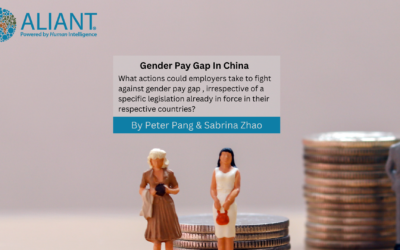The fact that sexual harassment is a huge problem in China is virtually beyond dispute. Unfortunately, however, studies indicate that almost all Chinese women are reluctant to speak out about sexual harassment. It has been estimated, for example, that the odds are about 25 to 1 against a university student reporting any given instance of sexual harassment. None of this is surprising in light of the price that is often paid by those who dare to report such behavior.
Organizational Consequences
The three most common negative organizational consequences used against those who speak out about sexual harassment are stonewalling, workplace retaliation, and blackballing.
Stonewalling
We’ve all dealt with bureaucratic stonewalling before, and the only difference when a sexual harassment claim is involved is the intensity of the response. Expect the bureaucratic runaround and repeated delays – plus a lot of nitpicking (“You forgot to dot the “i” in your signature.”). Alternatively, you may simply be ignored. If that happens, you are going to need some outside assistance.
Workplace Retaliation
China has no specific, nationwide law preventing an employer from retaliating against an employee for refusing a sexual advance, for reporting sexual harassment, or for speaking out about it. Although that doesn’t mean that legal consequences can’t ensue (more generally stated laws might be used against retaliation by an employer), it does give the employer a freer hand to retaliate without punishment than he would have if the law were more clear-cut on this issue.
You might be unjustly terminated, demoted, denied a promotion or a raise, relocated from an office to a cubicle, or reassigned to the company’s branch office in a remote area of Qinghai province – the possibilities are endless, but it doesn’t necessarily end there.
“Blackballing”
A more informal way of retaliating against an employee who speaks out is called “blackballing.” You may be labeled an attention-seeker, for instance, who makes allegations of sexual harassment due to a deep-seated psychological need for attention. Or you may be accused of ambitious or vindictive motivations. The professional consequences of blackballing can be daunting indeed.
You may be excluded from or not even notified of important meetings, for example. If you work with your own clients (in a professional partnership, for example), you might find that someone is hollowing out your client base by contacting them outside your presence and encouraging them not to work with you any more. All of this can happen without you even becoming aware of it until it is too late.
Social Consequences
Even if you suffer no discernable organizational consequences for speaking out on sexual harassment, you may face severe social consequences. The following is a rundown of the consequences faced by many Chinese women who found the courage to speak out.
Shaming and Victim-Blaming
Shaming and victim-blaming often take the form of ostensibly innocuous remarks or “innocent questions” that contain a hidden barb.
“What were you wearing at the time?” There is no right answer to this question, of course.
“OK, how much do you want?” The implication is obvious.
“How many men in the company have you slept with?” Although this will rarely be asked directly, bringing up the sexual history of the victim is thought by some to be an effective way of insinuating that the encounter must have been consensual since the victim is known to be “easy.” The “s” word may be used extensively in frequent whispered (but meant-to-be-overheard) conversations.
“You must have been leading him on. What do you expect?” In the minds of some, the mere presence of a physically attractive woman constitutes the “leading on” of every heterosexual male in the vicinity – which is difficult to reconcile with an employer’s demand that an employee be present for duty at least 40 hour every week.
“You have defamed me. I’m going to sue you!” Recent events in China strongly suggest that this is not an idle threat.
Gaslighting
“Gaslighting” often happens in small, close-knit office environments where groupthink prevails and dirty little secrets are swept under the rug. If you see elephants crawling under the rug (so to speak) and nobody seems to notice them but you, you may have become a victim of gaslighting.
The term “gaslighting” refers to a particularly advanced stonewalling tactic in which a person or a group of people attempts to cause the victim to question their reality.
In gaslighting, the attempt is not so much to discredit you in the eyes of others as to get you to doubt your own memory, perceptions, and reasoning powers, with the ultimate goal of discrediting you in your own eyes and prompting you to retract your claim. Telltale signs of gaslighting include:
Telling you a blatant lie even though you know the truth to be otherwise: “I was in Japan on the date of the office party.” – even though his photo, taken at the party with other guests, appears in a photo on the office bulletin board (“That’s not me – you need a new pair of glasses.”).
Aligning a group of people against you: It is difficult to hold fast to what you know to be true when everyone around you seems absolutely certain that it’s not.
Deliberately isolating you, either physically or socially: They may attempt to get you to do their dirty work for them by dropping subtle hints designed to get you to distrust your colleagues. If this starts happening, it is likely that the perpetrator is dropping the same kinds of hints about you in the presence of your colleagues in an attempt to get them to distrust you as well.
Saying something right in front of you and later denying that they ever said it. This may happen over and over again regarding a variety of matters, none of which relate directly to your sexual harassment claim. The purpose is to get you to doubt your own memory.
A close correlate to gaslighting occurs when someone attempts to discredit you in the eyes of a third party by questioning your mental health.
Batten Down the Hatches…
Pressing a sexal harassment claim in China can be a rough ride. This isn’t always the case, of course. A lot depends on your company’s corporate culture as well as the character of the perpetrator. But you do need to prepare for turbulence so that you will be ready if it does occur. In case you get discouraged, try to think of all of the possible future sexual harassment victims whose lives might be made better by your courageous example. Let us help you fight back.
*Peter Pang is the managing partner of Aliant’s Shanghai, PRC office. The firm’s primary practice focuses on assisting foreign companies in doing business in China and has legal expertise in Intellectual Property, Foreign Direct Investments, including equity joint ventures, employment and labor laws and mergers and acquisitions. Mr. Pang has studied both in the US and China, and is a frequently speaker and contributor to topics such as US China trade, franchising and protection of intellectual property and trade secrets. He is the author of a number of articles and chapters in books on the same topics, including transfer of technology.
This article was originally featured on our partner, IPOPANG’s, blog: https://www.ipopang.com/blog/
FOLLOW US ON LINKEDIN
SEE MORE ALIANT INSIGHTS




